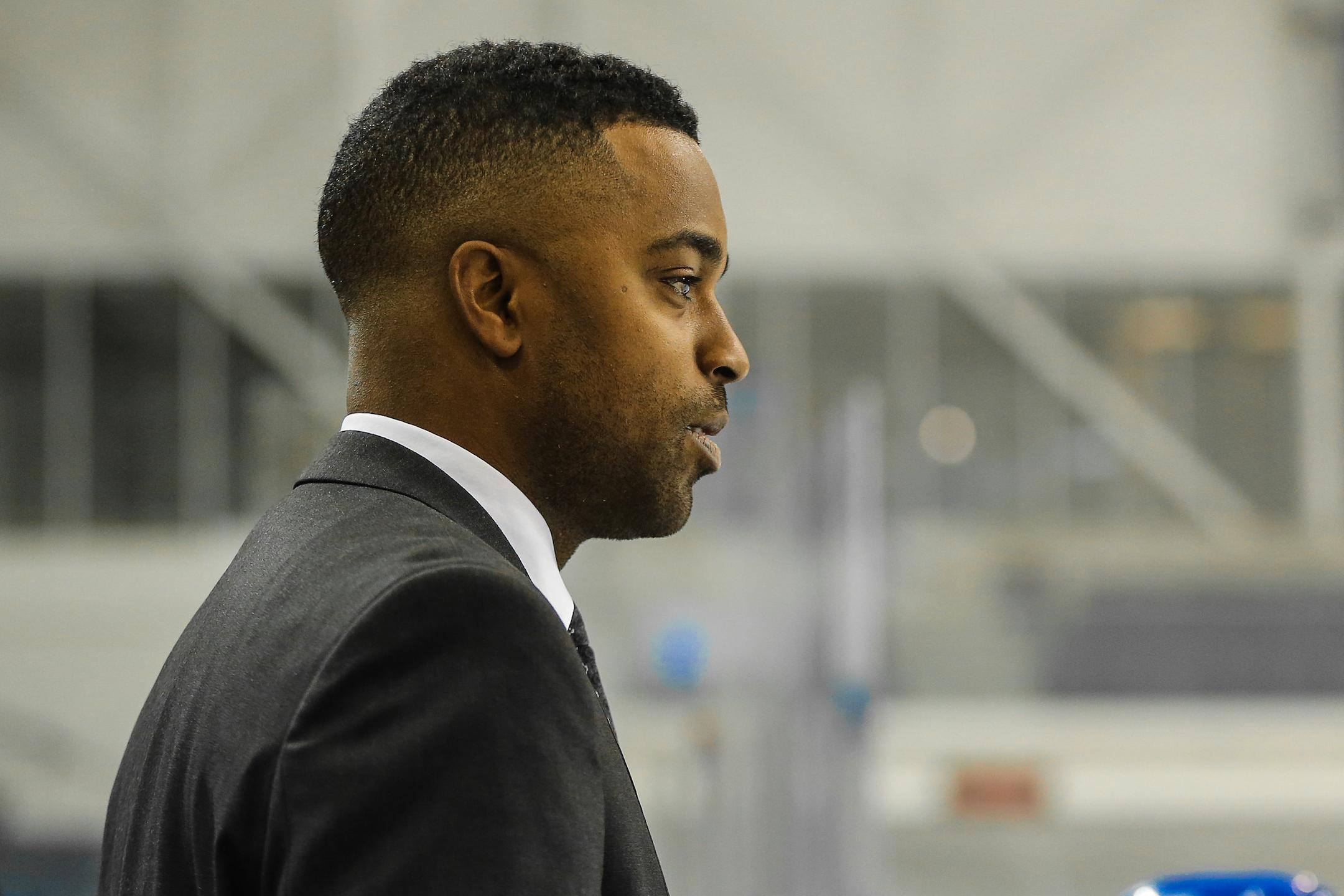By Daniel Centeno
Ryerson Rams hockey coach Nathaniel Brooks fondly remembers receiving his first pair of skates and hockey equipment at three-years-old for Christmas.
“Hockey was always the sport for me,” Brooks said. “You can tell from the pictures that Christmas I’m the happiest guy on the planet.”
With his father’s side of the family hailing from Nova Scotia, where Brooks says hockey is loved by the Black community, he quickly fell in love with the sport. This passion led him to play in several leagues growing up, ranging from the Ontario Junior Hockey League to U Sports, and even the United States Hockey League.
His favourite player was Colorado Avalanche legend, Peter Forsberg. Forsberg’s abilities as both a skilled winger and power forward inspired a young Brooks to model aspects of the way he played the game after the Hall of Famer.
Today, as one of few BIPOC (Black, Indigenous and people of colour) coaches in hockey, Brooks is helping to improve the game’s diversity as a mentor to the next generation of racialized players and coaches.
“The more guys like myself [that] provide mentorship and be someone that those kids look up to, I think that is where that change is going to come from,” said Brooks. “That’s why it’s so important for me to stay positive and continue helping as many kids and families as I can to gain that kind of love of the game that I did.”
With a passion for coaching that blossomed following his playing days in 2013 for the Whitby Dunlops of the Allan Cup Hockey (ACH) league, Brooks became an assistant coach for a Pee Wee hockey team. He brought his previous experience as an instructor for Skillz Hockey, a hockey camp started by his father in the 1990s, to the role.
From there, Brooks joined the Ryerson Rams men’s hockey team as an assistant coach in 2014 and became a developmental coach in 2019. In his current role, he works away from the bench to help players with their individual skills and focus training.
This past summer, the 35-year-old coach was invited to partake in the first NHL Coaches Association BIPOC Coaches Program, which aims to guide and support BIPOC coaches in all aspects of the game, including networking and in-game decisions such as setting up special teams for power-plays and penalty kills.
Brooks saw this as an opportunity to share his coaching methods and his goal to coach the NHL in the future.
“Now with the new BIPOC program, there’s even more opportunity to communicate, integrate and get ideas from coaches at the top level, and ask as many questions as possible and express my interest in eventually being there too,” said Brooks.
NHL coaches participating in the program include St. Louis Blues head coach Craig Berube, Tampa Bay Lightning goaltending coach Frantz Jean and Toronto Maple Leafs video coach Sam Kim.
“The more coaches at the top who are committed to that, I think it helps guys like me and brings more awareness to the game in different communities”
On the NHL level, Brooks considers Vegas Golden Knights assistant coach Steve Spott as a mentor.
During his time as an assistant coach for the San Jose Sharks, Spott met regularly with Brooks to discuss video breaking down games and specific plays, organizing weekly practices and how to carve out a team’s identity. Spott’s guidance and advice supported Brooks to instill these lessons in the Rams, who continue to be an annual contender in the Ontario University Athletics (OUA) and U Sports championships.
Brooks believes that top-level coaches voicing their support for growing the game by fostering more opportunities for BIPOC coaches can lead to more positive changes at the grassroots level, which in turn can create more opportunities for marginalized people to join coaching and management.
“The more coaches at the top who are committed to that, I think it helps guys like me and brings more awareness to the game in different communities,” he said.
“To make changes in coaches and management, you have to get more players involved, and I think that part of it, especially in the [Greater Toronto Area] a lot of teams are culturally diverse across the board through the age groups,” he observed. “ I think the natural progression is like me, I played the game my whole life and progressed into coaching, and I think that is what you are going to see.”
Brooks mentioned former GTA-raised NHL players Chris Stewart, Trevor Daley and Joel Ward as key players who are pushing back against the tradition of predominantly white coaching and management. Stewart is currently a player development coach for the Philadelphia Flyers, Daley is a hockey operations advisor for the Pittsburgh Penguins and Ward is an assistant coach for the AHL’s Henderson Silver Knights, the minor league affiliate of the Vegas Golden Knights.
“These are all guys that came up and had good mentors, and I think they are kind of setting the stage for more opportunity at the coaching level and the management level,” said Brooks.
“My mission is to help people develop a love for the game like myself”
Ward, who is well-acquainted with Brooks and Rams head coach Johnny Duco, famously joined a team practice at the Mattamy Athletic Centre during the 2018-2019 season as a free agent. The 40-year-old now retired winger is one of the most successful U Sports alumni, playing in 726 NHL games and scoring 304 points. Hailing from the University of Prince Edward Island, Ward’s point total is the most scored of any Canadian university player to make it to the NHL, according to U Sports.
Looking ahead
As Brooks continues to work towards his goal of becoming an NHL coach, he reiterates his responsibilities of today, working with the Rams and at the Pee Wee level with the Don Mills Flyers of the Eastern AAA Hockey League. He hopes to ensure that these players are provided with the right guidance and are part of the positive changes he believes are gaining traction in the game today.
“My mission is to help people develop a love for the game like myself,” he said. “Anything is possible if you want to move up the ladder and have success in the game.”
Along with other efforts, like the Hockey Diversity Alliance at the NHL level, Brooks is delighted to see more players of different backgrounds joining the game at every level each season.
“Hockey is a great game, and it shouldn’t be something they feel they can’t play,” said Brooks. “The more we get everybody involved in making things more inclusive, the better.”












Leave a Reply